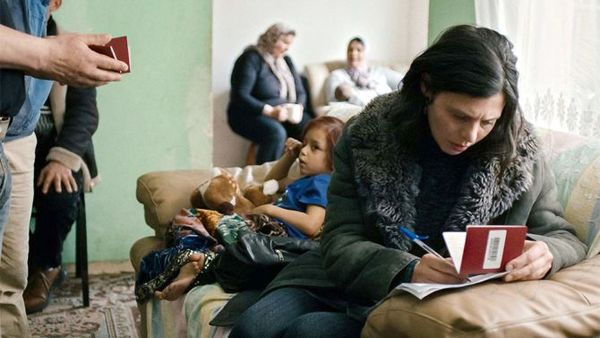Eye For Film >> Movies >> Marija (2016) Film Review
Marija
Reviewed by: Jennie Kermode

A young woman walks down the street. Her face is hard. It's difficult to guess a the emotions behind it. Is it a ruthless face or the face of somebody so bruised by the world that she won't let anyone in? One thing is certain: she is determined to reach her destination. Marija is Ukrainian, washed up in Germany, unwilling to go back, no matter what. She'll take whatever work she can get, somehow feed herself, pay the rent, put some money aside, all to support her humble dream of owning a salon; then she can be independent, relatively safe, free.
"Why don't you get a normal job?" someone asks along the way. She doesn't answer. There's a weight of unguessed privilege behind that question. Losing her job as a cleaner when her undocumented status is discovered throws her into crisis, forcing her to accept the sexual advances of her slum landlord so that she can keep a roof over her head. He quickly becomes emotionally attached, which could provide her with some protection but could be very dangerous. He gets her work as a translator. Through this, she - and the audience - witness the experiences of other immigrants in desperate situations. This is Dortmund, a city with a GDP per capita of £31,000, yet people are having to choose between food and medicine. It's a scene one might see in any major European city, yet people don't see, even though it's right in front of them. Like Ken Loach with I, Daniel Blake, director Michael Koch is concerned with giving his audience a different perspective on the familiar.

In the central role, Margarita Breitkreiz gives a formidable performance. Much of the time, Marija is keeping her true feelings hidden from other characters, yet we see who she is and what it costs her to endure seemingly endless petty cruelties and disappointments. At times she recalls Jackie Brown, though her story is told in a very different way; her strength comes from years of doing whatever it took to survive. Her single-mindedness and intense focus help her to shut out the noise and escape being broken down by other people's opinions of her, though we can see that they still hurt. Her completeness is shocking to the men who seek sexual ownership of her, even to the one who fantasises about saving her, yet Breitkreiz ensures that it's never a mystery to the viewer.
Much of the film is shot in close-up so we are drawn to the small interactions between individuals on which a great deal depends. It also reinforces the sense of claustrophobia in crowded slums. Our inability to see much of the background means we share the migrants' fear that immigration officers may be about to pounce at any time. Cinematographer Bernhard Keller makes extensive use of natural light and the grey, bruised tones of Marija's environment, together with the evident decay around her, invite us to picture what t is she must have run from, what it is that was worse. There's no need for the drama of bombs or guns, so often used in telling immigrant stories, to tell us why she would desire so strongly to change her life.
A compelling drama that effectively explores a large section of society through its focus on a single character, Marija may be a tough watch but it's a powerful piece of work.
Reviewed on: 23 Feb 2017
















